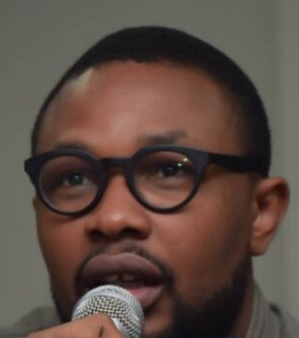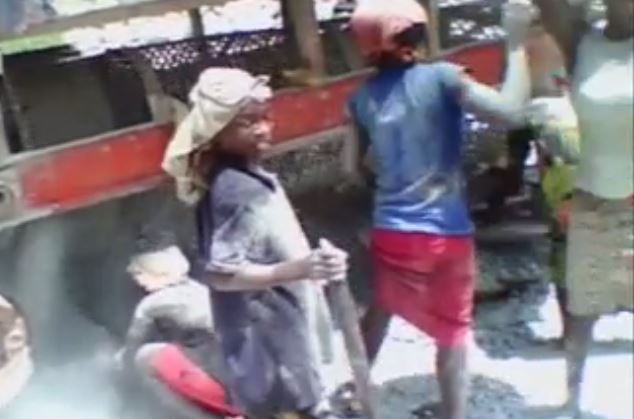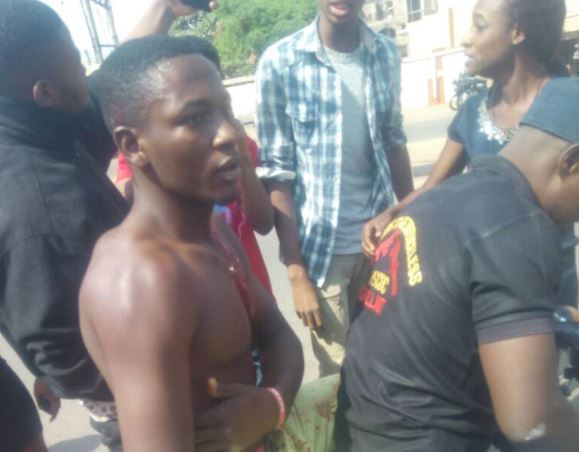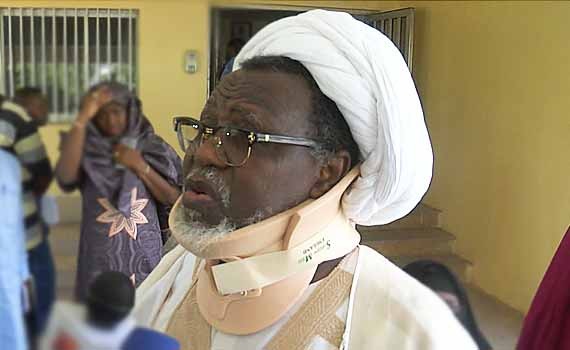Story Highlights
- Mining is a family business in some poor communities in Ebonyi
- Encouraged by their low rates, artisanal miners often engage child miners to work during school hours
- Some of the children working in Ebonyi mines and granite sites are orphans
- Ebonyi solid minerals ministry is handicapped, can’t effectively curb child mining
- Children working at the stone crushing sites are susceptible to tuberculosis, kidney disease, and lung cancer.
- A number of children have drowned in pits abandoned after conclusion of mining activities
The middle-aged man struck continuously at the big stone as the girl-child, armed with a mangled metal carrier, waited for her turn to fetch broken granites and climb up the makeshift steps of the uneven large pit to hand it over to another boy whose job was to ferry it to the next carrier, an adult.
It was around noon on a Friday and while their peers were learning in school, children — parentless and poverty-stricken — were in the belly of a granite pit working to make a buck — because if they do not, food will elude them back at home or wherever it is they retire for the night.
Some were there out of necessity; for some, it was compulsory; for most, it was circumstantial. But the children have two things in common: they are missing out on an education and are being exposed to hazardous substances which portend grave danger to their health in years to come.
To silent, discreet observers, it was a sad sight to take in but for them, it’s a reality they must live, a routine they’ve become accustomed to.
Advertisement
This is the story of disadvantaged children and orphans who work side by side adults in lead mining and granite crushing sites in Ebonyi, bereft of protective gears and air-purifying respirators — in a bid to eke out a living, help their mothers, and put themselves through school.
Shall we begin?
FAMILY BUSINESS
Despite posing as a buyer, this reporter was keenly watched and his movement was closely trailed. Artisanal miners are cagey and can be violent because most of them are operating illegally, hence the apprehension and paranoia that accompany their interaction with strangers.
Advertisement
Journalists, on the other hand, dare not introduce themselves, else they’d be asked to leave and failure to do so will attract a hostile treatment.
Standing atop the mine at Okposi Umuoghara in Ezza North LGA, and looking down at the granite pit from over 80 feet above, you could never miss the figures of children consumed in their tasks. With forlorn faces, they carried out their tasks with the precision of workers who have plenty practice.
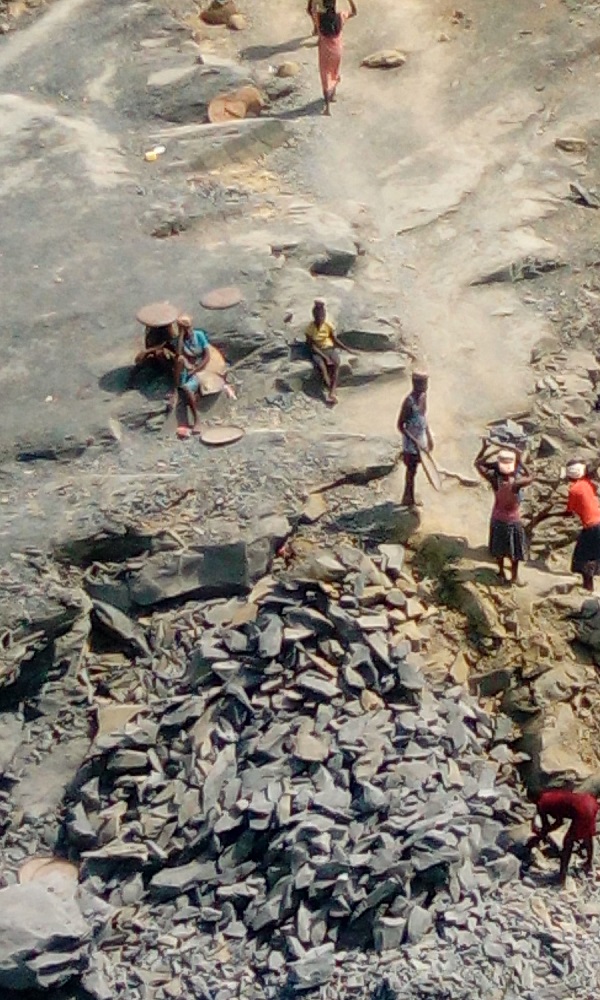
At the lowest edge of the pit, one of the children – a young girl – bared a half-smile that faded almost as swiftly as it appeared. After failing to get reciprocity, she looked away.
A group of mothers observing their rest had noticed the non-verbal interaction with the child. One shouted in Igbo, “give me money for pure water”.
Advertisement
Women and child labourers in lead mines and granite crushing sites are paid between N200 and N500 per day, depending on the power of negotiation – if any.
Later, the Eze of Okposi, Anthony Njoku, said the situation – where mothers bring their children to work in mines – is a direct result of abject penury and the need to find a way to make money to eat.
“There is serious poverty around here. People are suffering. Some of these women take their children to the mine so it is like a family business,” he said.
“You cannot tell these women anything about education or that a disease will kill them and their children in 20 years when they have nothing to eat today.
Advertisement
“Some of the children working in the mines. Most of them are orphans.”
THE WHITE-FACED ORPHANS
Njoku was right.
Advertisement
Some of the children who interacted with this reporter at granite crushing sites in the village said they had neither mother nor father.
Child labour is illegal in Ebonyi but young boys and girls, whose faces were covered in white granite dust and whose headscarves were discarded T-shirts, worked with the dedication of adults.
Advertisement
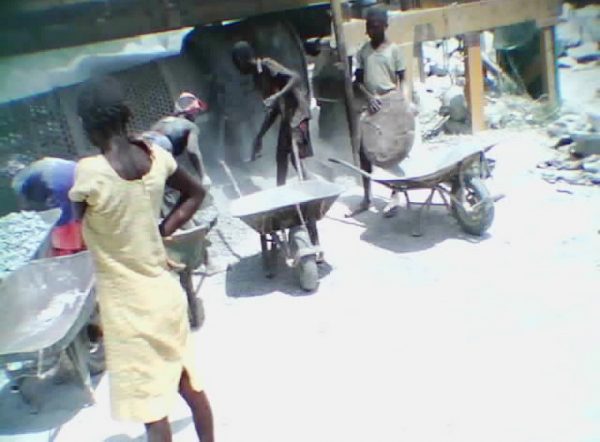
Three boys in their early teens said they were working to raise money for school fees.
Chima, Obinna, and Monday had been deeply consumed with their work so it was initially difficult to engage or prise them away.
Advertisement
Despite being in Primary 5, they struggled to converse in English. Obinna had the best grasp of the English language.
Our rushed conversation played out thus:
Reporter: Nna, bia (Young boy, come). Wetin be your name?
Obinna: My name is Obinna.
Reporter: What class are you in?
Obinna: Primary 5
Reporter: Why you no dey school?
Obinna: I don’t have money
Reporter: What of your parents?
Obinna: My daddy has died
Reporter: What of your mummy?
Obinna: My mummy is dead
Reporter: You no go school for Monday?
Obinna: No, I no get money.
Reporter: How much is your school fees?
Obinna: My school fees na N3,000
For Akah Friday, who had tagged along with his mother that morning as he had been doing for weeks, it was a different story.
With his rosary beads dangling out of his shirt, and seemingly in a haste to return to his job, Akah reluctantly granted a brief audience. He is the co-breadwinner of his family and the job must be done, he said. Of course, Akah would love to be in school, but there’s no “ego” (money) for that.
Akah is just one of the young boys who had accompanied their mothers to the site.
A granite dealer, who spoke under the assumption that he was addressing a potential buyer, painted a picture of the plight of the children when probed.
“They may decide to go to school either two days a week and use the other days to work to get something to sustain them in school,” he said.
“For you to be in school, there should be something to sustain you there. Some of them have no resources. They sometimes sneak out, do this job and go back to school.
“This is the way to survive.”
Across the road in the centre of another stone-crushing site was an emaciated child, not more than three years old, whose wailing was competing with the loud grunt of the machine.
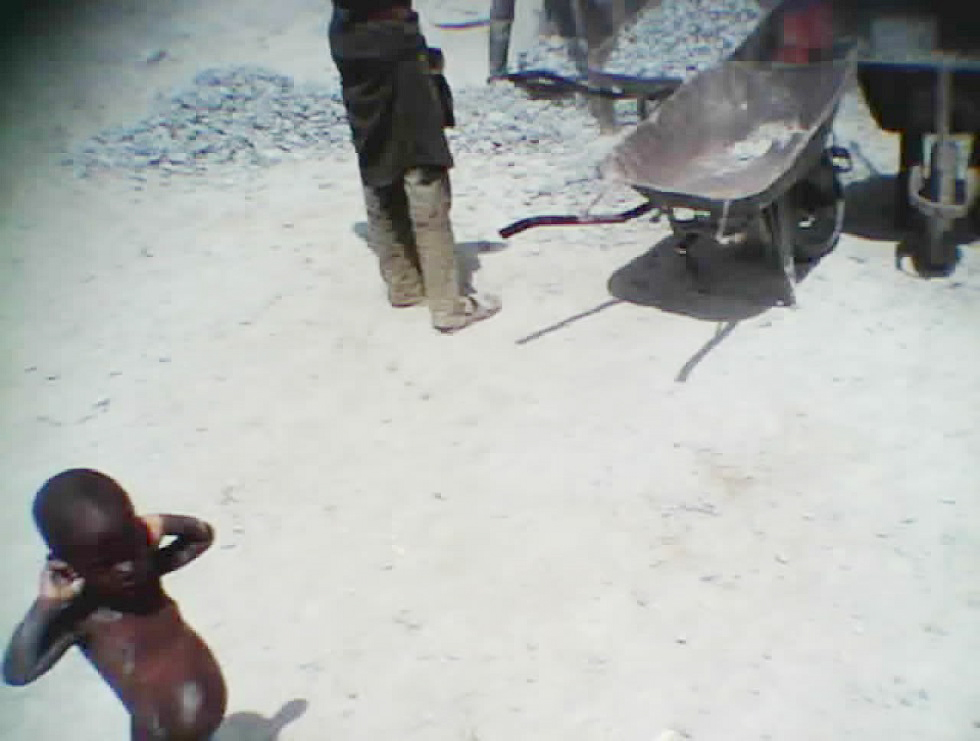
His mother was busy with work, therefore, the toddler’s cry for attention, irrespective of his reason, was an exercise in futility. His mother was one of the women saddled with the responsibility of delivering big stones to the heavy-duty machine for crushing.
On a closer observation, another woman had an infant strapped to her back as she journeyed back and forth, even as the haze of granite dust swirled around her.
Like the toddler, the infant was crying but the mother could not be bothered. The task at hand, it seemed, was more pertinent.
CHILDREN MINING FOR IRON OXIDE, ZINC, LEAD ALLOY
At a lead mine in Enyingba, this reporter took on the disguise of a non-governmental organisation worker who had come to find out what it would take to get women and children out of the mines.
Although the artisanal miners insist that children cannot be found in the mines during school hours, there were no less than fifteen under aged children working in some of the many narrow pits carved inside the massive pit that had grown wider with years of mining activity.
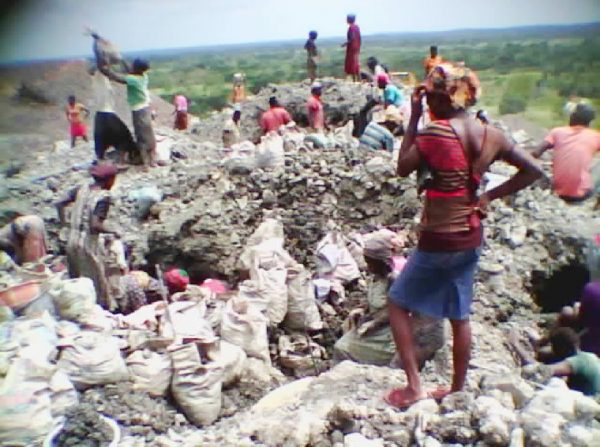
Chioma and Chimaroke were two young ones who were found there at about 11am on Monday; breaking stones and digging for hidden, valuable solid minerals – iron oxide, zinc, and lead alloy.
While Chioma said she was sent out of school over her inability to pay N700, Chimaroke said he was working to save money to return to school.
Armed with 3kg of stones, Chimaroke said he hoped to make N280 from his day’s labour. As he spoke, some of the artisanal miners came closer and put on a show of attempting to seize his unearthed stones, because, according to them, he should not be there during school hours.
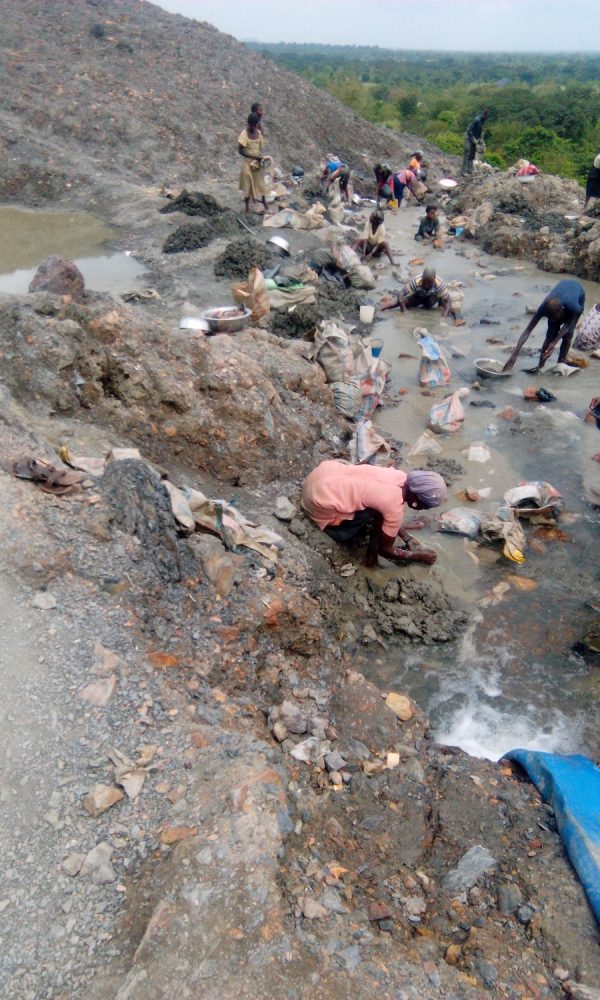
Although he would later be forgiven and handed back his goods, the fizzling hope, growing despair, and countenance of resignation was evident in his face when it seemed as though his day’s toil was about to disappear into the wind.
John Eke, the commissioner for education in Ebonyi, said he had no idea children were working in mining sites in the state.
“The child rights act covers all those things,” he told TheCable while expressing surprise.
“Because of this visit, we will come out with a public press release through the office of solid minerals. Now that you have alerted me, I will do something about it because it is harmful.”
When asked if there’s an enforcement group in place against child labour in the state, he said: “We have a task force in place against loitering and hawking. They normally arrest and take such children to remand homes. Under the child right act, they have the power to arrest and remand.”
Eke said the task force’s activities will “now be extended” to areas where child mining is taking place.
In February 2017, a survey found that only 43 percent of Ebonyi pre-school children were attending any form of organised school system while 57 percent were out of school.
It was carried out by the Multiple Indicator Cluster Survey (MICS 2011) in collaboration with United Nations International Children Education Fund (UNICEF), National Bureau of Statistics, National Household Demographic Survey (NHDS 2013) and Education Management Information System of the Ebonyi ministry of education.
ILLEGAL MINERS ‘BACKED BY STATE GOVERNMENT’
Artisanal miners, who more often than not lack the necessary expertise and know-how, excavate lands and leave large pits scattered around several communities in Ebonyi.
The mining act says one must have a mining title from the mining cadastral office and that the company must be registered with the CAC before operating a mine.
An official at the federal ministry of solid mineral office in Ebonyi, who refused to speak on the record, said most artisanal miners lack these prerequisites.
Blaming the state government for setting up cooperatives for the artisanal miners, he described their establishment as illegal and attributed it to the spate of children miners in Ebonyi.
He said such a practice can never be found in mines operated by registered companies who have mining titles.
He said the state office of the federal ministry of solid mineral lacks the power to monitor and regulate their activities because they did not issue them mining titles to operate.
“You might still need to go back to the state government and make enquiries. As far as this office is concerned, they are doing illegal mining,” the official said.
“Those people are working in conjunction with the state government. They put them in mining cooperatives. Based on the mining cadastral office, that area belongs to Royal Salt.”
When contacted, Olaoye Joseph, the mines officer, said the ministry is taking action on child labour but refused to divulge the nature of measures being employed to put an end to the anomaly.
“The ministry is taking action and very soon, you will know what we are doing,” he said.
EBONYI SOLID MINERAL MINISTRY HAS ‘NO POWER’
Two visits made to the Ebonyi state ministry of mines failed to yield the desired result as the commissioner was not on ground on both occasions.
Francis Orji, in June 2017, took over from Sabinus Nwakwegu as commissioner for solid minerals.
No one was willing to speak on the record or even off record, “unless permitted by the honourable commissioner”.
A ministry official – who chose to remain unnamed – disclosed that a lot of sensitisation has been done on the issue of child labour in artisanal mining and granite crushing sites but “we have no power to enforce because there’s no provision to punish them in the law”.
The official added that “even the federal ministry of mines office in Ebonyi is understaffed,” adding that “the former commissioner used to go in his personal vehicle to use canes to chase out children from the mines”.
Speaking on the mineral resources management committee (MIREMCO) in the state, the official said, “there’s MIREMCO but it’s more in theory than practice” and that “although we know the problem, there’s little we can do to address it. “This ministry was formed in 2015 and ever since, we have no single monitoring vehicle”.
Several calls put across to the Ebonyi commissioner for solid minerals were neither answered nor returned. He later sent a text message saying he was in a meeting, but subsequent attempts to reach him proved futile.
HEALTH HAZARDS AND CHALLENGES
When concrete, stone, brick, or granite are cut or ground by workers, they create a cloud of dust which contains crystalline silica, which when inhaled, can lead to an incurable lung condition known as silicosis.
Acute silicosis occurs after weeks or months of exposure to high levels of silica dust, while accelerated and chronic silicosis are caused by exposure to lower levels.
Death from acute silicosis can occur within as little as a few months while the first symptoms of accelerated silicosis can begin five to ten years after exposure has occurred. For chronic silicosis, symptoms may appear 10 years or more after exposure has occurred.
Silicosis – whose symptoms include shortness of breath, cough, wheezing, and tightness of the chest – can lead to diseases such as tuberculosis, pulmonary hypertension, arthritis, kidney disease, and lung cancer.
These symptoms may become worse as the disease progresses, leading to death.
Kelechi Okezie of the Neighbourhood Environment Watch has, for several years, been involved in sensitisation and advocacy on the side effects of mining in Ebonyi.
He said apart from the children who are introduced to child labour, some of the women working in the mines are infected by “most of these long-distance drivers with all forms of diseases, especially HIV”.
Okezie said most of them (children and mothers) suffer from pneumonia and chest pain as a result of the daily inhalation of harmful substances.
Peace Okike, the officer in charge at the community health centre in Okposi, corroborated Okezie’s claim.
“When we go out for outreach for HIV clinic, we get a lot of HIV positive [women] there and children that have dropped out of immunisation,” she said.
“Even when those children are sick, they [mothers] will send a little kid to bring them so you won’t be able to ask them the right questions on the state of the sick child.”
She said the some of the women and children often come down with malaria and tuberculosis, and hardly have time to take care of themselves – because of work.
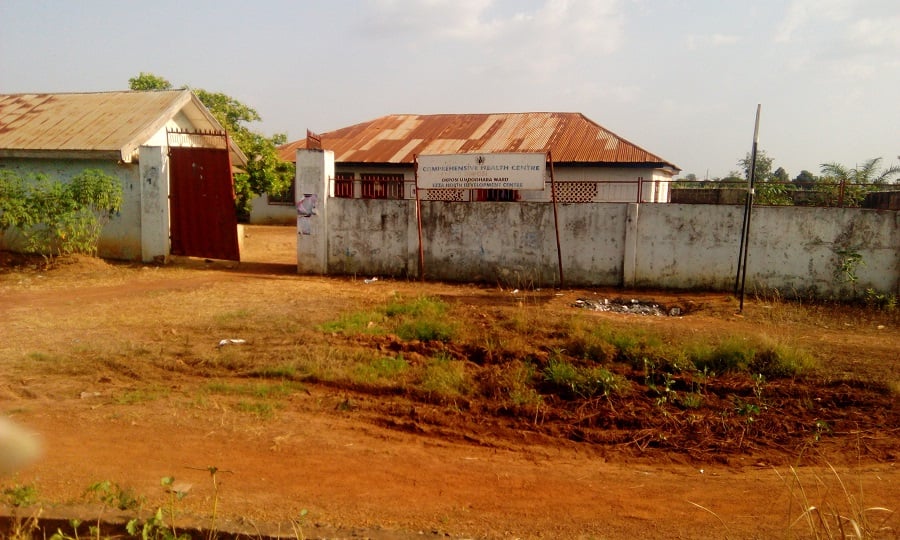
According to Okike, the women and children often complain of heavy coughing and chronic headache. She said some of them carry out their tasks with open wounds but that “it’s not their employers’ business. They only want their work done”.
She continued: “I have an HIV patient. I use my bike to go and give the woman drugs. At a point, she said I should stop giving her drugs that she does not have food. And it is true, because when you are taking anti-retroviral drugs and you are not eating a balanced diet, you cannot continue taking the drug.”
In December 2017, Daniel Umezuruike, the Ebonyi state commissioner for health, said 260,000 persons were estimated to be infected with HIV in Ebonyi.
He, however, said there were 202 free HIV health service facilities in the 171 wards of the state.
Painting a rather sordid picture, Okike said some women give birth while working at the mines and crushing sites.
“Sex there at the mines and quarry sites is like buying groundnut and chewing gum. Even some of them that are pregnant, deliver their children there,” she said.
Okike, who has been working in the community health centre for five years, said the lack of basic amenities and staff quarters in the health centre have made it difficult to attend to the women and children working in the mines “when they come back from work late at night”.
She said the common scenario of failing to complete their free tuberculosis treatment portends grave health conditions like deafness or dumbness. “We have a lot of breakdown of treatment and they are there, spreading it to others. What they are after is to work and make money.”
Isaac Adewole, the minister of health, in May 2017 said Nigeria is among six countries that account for 60 percent of new cases of tuberculosis globally.
He said this while opening a fully equipped chest clinic at the Mile Four Hospital, in Abakaliki, Ebonyi state capital.
DROWNING CAUSED BY LACK OF LAND RECLAMATION
While the children lose out on adequate education and stand the risk of terminal illnesses in the future, there’s also the grave risk of drowning in abandoned pits that have yet to be reclaimed years after mining activity ended.
Reclamation is the process of filling up an excavated piece of land after mining activity has been concluded on it.
Unlike the US where former mining lands have been transformed into solar farms and housing estates, in Nigeria, reclamation is few and far between.
Germany recently designed a 25-year, €8 billion programme to clean up and reclaim former uranium mines.
In Ebonyi and many other mining states in Nigeria, there are hundreds of open pits scattered around in several communities. Ebonyi has no less than 72 abandoned mine pits.
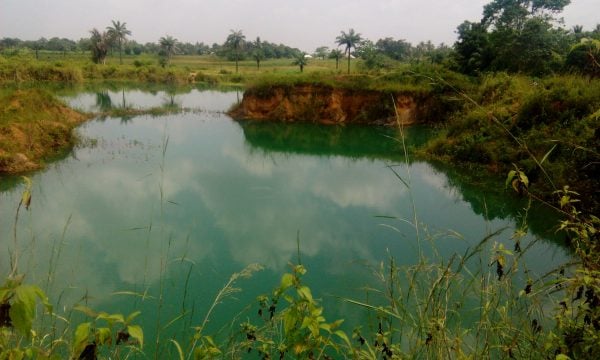
In one of such communities, Robert Egbere, an engineer, said two children, in July 2016, drowned when they went to fetch water in one of the pits.
He said due to series of such incidents, the villagers chased away the artisanal miners working in the community.
Also weighing in on the issue of open pits, Steve Opoke said: “Government should ensure that people without expertise should disengage from surface mining. They open these spaces and don’t close them. If you look at the depth of the ones in Ameka in Ezza South, you will become dizzy.
“They created unwanted, large dams that are risky to the inhabitants of the area. It’s something that will become worse than the Niger Delta area where oil is being mined.
“If we don’t regulate from the inception now that we want to make solid minerals the economic base, if we don’t streamline the methodology, the degradation will be worse than Niger Delta.”
Over eight years ago, hundreds of children died in Zamfara as a result of the adverse environmental impact of gold mining.
At the time, Medicines Sans Frontiers said 1,500 children had been affected by lead poisoning.
The communities hit by the tragedy were Yar Galma, Abare, Bagega and Dareta.
‘THE END IS IN SIGHT’
Donatus Njoku, the Ebonyi commissioner for environment, admitted that there was a problem, and said steps were being taken to address it.
One of such steps, he said, is to get mining out of the exclusive list of the federal government.
“Apart from people drowning in those abandoned pits there on yearly basis, most people that work there, because of non-availability of protective gears, inhale dangerous substances which constitute grave danger. The lands are also being lost once they are devastated and left in that state,” said Njoku.
“Because of the way they were handled in the past, you don’t even have the names and addresses of the companies who were mining there before.
“So, we have said enough is enough and everything is being done to ensure compliance with mining rules and measures. The problem we met on ground is that mining activity is on the exclusive list of the federal government.
“We’ve been discussing with the federal ministry of solid minerals to remove mining from the exclusive list of the federal government. It’s a constitutional matter and it will take time but they are listening.
“Things are happening and we believe that the end is in sight.”
On artisanal miners, Njoku said: “It is difficult to control some of these things because the deposits are found in their farmland. The government is bringing them into cooperatives so they can be assisted with funds to acquire equipment and safety materials.”
When quizzed on the non-reclamation of lands, he said: “The federal government set up a fund for the reclamation. When the fund is made available, we will use it.”
SOLUTIONS TO AN ANOMALY?
While the government, state and federal, gear up to take action on the issue, more and more children are being contracted to work in mines and are, therefore, being denied a chance to compete with their peers in future.
Although most government officials engaged in the course of this investigation recognise the obvious problem, little was proffered in terms of immediate solutions.
However, experts in the mining sector and stakeholders consulted on the matter gave their two-cents on a way out.
According to Okezie of NEW, the federal government should tackle the issue by arresting, prosecuting and punishing the artisanal miners who employ children, no matter the reason.
He also said special grants and funding should be provided for the women to go into trading, so as to discourage them from working in mines or encouraging their children and wards to do the same.
“Government should penalise offenders of the child rights act, especially those shylock businessmen that are engaging these children,” he said.
“Child rights act, mining act and common sense is against it but they want to maximise profit at the expense of these children. So, they should be arrested, prosecuted and penalised. That is one area that will serve as a deterrent and to get the children out of the mines.”
Eze Njoku believes government and non-governmental organisations should collaborate to curb the trend by assuming responsibility for the education and welfare of such children; orphans and those rendered helpless by poverty.
The monarch said: “Government should take that up as a duty because we don’t want to leave anybody behind. They should build a type of school like a boarding house and put them there.”
Steve Opeke said “extensive, continuous and exhaustive” sensitisation will be needed to nip the problem in the bud.
He also said the root of the problem lies in the country’s constitution.
“Restructure the legislation to put mining in the concurrent list. Some state governments are handicapped because mining is in the exclusive list,” he said.
“You have to bring the enforcement authorities closer to the people.”
But in a country where the process of making or modifying legislation and acting or reacting to a problem is done in snail pace, it begs the question of how long children will have to work in mines which put their health and education – and consequently future – in jeopardy.
How long before something is done?
Until there are answers, the children will continue to toil in the belly of Ebonyi pits, under the stinging sun in a bid to earn meager income. They will continue to work during school hours, for eat they shall and therefore, die they may – years after the labour may have ended.
This is a special investigative project by Cable Newspaper Journalism Foundation (CNJF), in partnership with TheCable, supported by the MacArthur Foundation. Published materials are not the views of the MacArthur Foundation.
Add a comment
